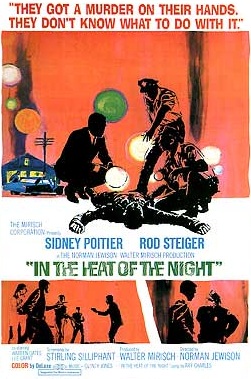
1967--In the Heat of the
Night—Norman Jewison
Nominated: Bonnie and
Clyde, Dr. Doolittle, The Graduate, Guess Who's Coming to Dinner
Should have won: Bonnie
and Clyde
Be sure to see: Cool Hand
Luke,Wait Until Dark
“What do you mean I'm
holding the wrong man? I got the motive which is money and the body
which is dead!”--Bill Gillespie
In the Heat of the
Night caught my attention immediately with the visual of the
train and Ray Charles' voice singing the theme. I loved this movie
and one of the main reasons is the music, in particular, the score
written specifically for the screen by Quincy Jones. No piece of
music had already existed; every bar of music was original.
It is a hot night in the
racially tense Sparta, Mississippi, and an officer on patrol
discovers a body in the street. Doing rounds in the area looking for
suspects he finds a black man waiting for the 4:05 train to Memphis
and arrests him as a suspect. Upon returning to the station it is
revealed the man is Virgil Tibbs, Philadelphia's number one homicide
expert who is in Mississippi visiting his mother. After his identity
is cleared he is free to go. But when a suspect the police is
positive is the killer is arrested, Tibbs uses his intellect and
experience to prove the man's innocence. Rather than going home, he
stays and takes the case.
I loved every moment of
this movie. Sydney Poitier is a very commanding presence. Rod Steiger
rightfully won the Oscar for his performance as Bill Gillespie. His
character is constantly chewing gum (it is reputed Steiger chewed 263
packs of gum during filming) examining the situations. He probably
knows (but won't admit) he isn't as smart as Tibbs. He is also
thankful to have someone as capable as Tibbs on his side but at the
same time is concerned about his presence. The people of Sparta
aren't too keen on the idea of a capable black man in town, much less
running the ship, as when Gillespie saves Tibbs from a group of white
men who have him cornered. I love the climax of this scene. When one
of the men states what is on his mind, Gillespie slaps him around,
then moves on to the next one.
The movie was very
popular with black audiences because of Tibbs and though he has many
key moments the one that seems to stand out has to be “the slap
heard around the world.” Tibbs finds a plant in the victim's car so
he and Gillespie go to Mr. Alvacot's greenhouse. Tibbs questions
Alvacot on the case and gets slapped. He immediately slaps Alvacot
back. Alvacot is stunned but so is Gillespie, even when Alvacot asked
what will be done about it. In 1967, it was a very powerful moment to
see Tibbs strike a white man. I, of course, thought of the moment in
Night of the Living Dead the following year when Ben
strikes Barbara.If you've seen it, you understand.
Who actually committed
the murder, the motive, the location of where the murder took place
compared to where the body ended up, and other instances in the case
seem to be secondary to the performances and the racial tension. In
the Heat of the Night is one of the best detective movies I've seen
and though Poitier drives the film, my favorite aspect is Steiger as
Gillespie. But I must say whenever he was on screen I couldn't help
but picture Carroll O'Connor in his role from the television show.
In the Heat of the
Night is completely worthy of a
best picture nomination, but Bonnie and Clyde is
a monumentally superior cops vs. bad guys movie. By far the correct
choice for what should have won the Oscar. I wonder if it was one of those cases where the award "had to" go to Heat. Just a theory but it is still very good and worth a look.
263 pieces of gum?! Yikes. Fun fact.
ReplyDeleteSometimes I think movies have to win best picture because of their influence to future films and even society. This film addressed a lot of controversial issues and inspired more films like it. I hope 'influence' is one of the categories the Academy considers when choosing a Best Picture winner.